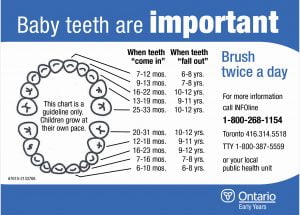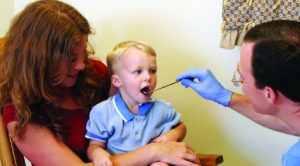- Home
- Health Topics
- Pregnancy to Parenthood
- Baby Teeth and Teething
Baby Teeth and Teething

 Baby Teeth are Important for:
Baby Teeth are Important for:
- Chewing food well.
- Learning to speak properly.
- Keeping space open for adult teeth to grow.
- General good health.
- Smiling and appearance.
- Teething.
Teething is a natural process. Baby is born with a set of 20 teeth hidden beneath the gums. Teething is the process of these teeth working their way through the gums.
The first teeth normally appear between 6 and 10 months of age with the rest following over the next 2 to 3 years. This is only a guide; each child is different. It is important that these first teeth are kept healthy, as they each keep a place for the adult teeth that come later.
Your child will lose his or her first teeth starting at about 6 years. The first adult teeth to appear are 4 molars. They come in behind the baby molars.
Signs of Teething
Teething can cause minor discomfort for your baby. You might notice the following signs as teeth begin to appear through their gums:
- Drooling.
- Being more cranky and irritable.
- Having red cheeks and red, swollen gums.
- Showing a need to chew on things.
How to Help Baby During Teething
- Massage irritated, swollen gums with your finger for a couple of minutes.
- Massage the gum with a clean, wet cloth that has been chilled in the refrigerator.
- Babies massage their own gums by chewing on hard, smooth objects. Give them a teething ring or a wet cloth that has been chilled.
- If these suggestions don’t seem to help, you can give baby a dose of over-the-counter pain reliever. Talk to your health-care provider or pharmacist about which one is best and how much to give. Over-the-counter gels for teething should not be used unless advised by your doctor.
Public Health Preventive Clinic
Public Health Preventive Clinic helps your children prevent cavities and keep teeth and gums healthy.
- We can clean teeth.
- Apply flouride.
- Coat teeth with sealants.
- Show your child how to brush.
- Tell you about foods and drinks that are healthy for teeth.
- Check to see if your child is eligible for the HSO program.
Your Child can use the Preventive Dental Clinic if:
- He or she is 17 or under
- You can’t afford dental care
- You receive an Ontario Child Tax Benefit
Contact our Dental Program to learn more at 519-900-9600 Ext. 3293.
Start Good Dental Habits Early
- Clean baby’s mouth at least daily, after a meal or at bath-time. (use a soft cloth or gauze).
- As soon as teeth appear, change to a small soft toothbrush with water. Brush at least twice a day, usually at morning and bedtime. Parents should consult a health professional to determine if their child ages 0-3 is at risk of developing tooth decay. If your child is at risk, use about a “grain of rice” size of fluoridated toothpaste.
- When a child is able to spit, at around age 3, start using fluoridated toothpaste. Squeeze a small smear onto the brush. Have your child rinse his or her mouth and spit when done.
- Check your child’s teeth monthly. Check the front and back of the top four front teeth. If you see brown or white spots, call your dentist for an appointment.
- You can pass on germs that could cause cavities by putting baby’s spoon in your mouth before giving it to him or her.
- Only give your child fluoride supplements if they are recommended by your dentist.
First Dental Visits
- When your child is 1 year old, start taking him or her to the dentist every 6-9 months.
- Your positive attitude is the most important factor in determining the child’s outlook on visiting the dental office.
- Take your child along when a sibling has a dental visit. Let your child meet the dentist.
- If your child has cavities, and you cannot afford to pay for them to be fixed, call the Health Unit. You may qualify for a dental assistance program for children.
Reference: Canadian Dental Association (online), 2016.
